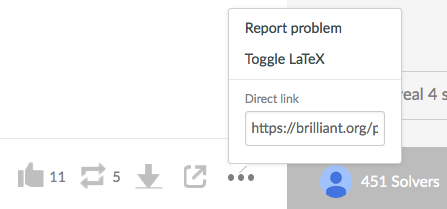Number of solutions of an inequality
Find the number of ordered 6-tuples of integers a 1 , a 2 , a 3 , a 4 , a 5 , a 6 satisfying
0 ≤ a 1 ≤ a 2 ≤ a 3 ≤ ⋯ ≤ a 6 ≤ 5 .
The answer is 462.
This section requires Javascript.
You are seeing this because something didn't load right. We suggest you, (a) try
refreshing the page, (b) enabling javascript if it is disabled on your browser and,
finally, (c)
loading the
non-javascript version of this page
. We're sorry about the hassle.
3 solutions
Please reformulate the problem to make it clearer. We're no looking for pairs, but for ordered six-tuples ( a 1 , a 2 , a 3 , a 4 , a 5 , a 6 )
The minimum value of the sequence is 0 and the maximum value can be 5. So we can view the sequence as a path from (1,0) to (6,5) Now any path from (1,0) to (6,5) will represent a valid sequence, as (1, a1) (2, a2) (3, a3)(4,a4)(5,a5)(6,a6) thus our sequence (a1,a2, a3, a4, a5, a6) can be represented by a path from (1, 0) to (6,5) consisting of only "Horizontal(represented by H)" or "Upward(represented by U)" move. i.e. any permutation of 6 H's and 5 U's will represent a valid path from (1,0) to (6,5) and thus can be our solution. So Ans = No. of permutation of (HHHHHHUUUUU) = 11! / (6! * 5!) = 462 Let us see a example for clarification. say, (a1, a2, a3, a4, a5, a6) = (1, 2, 2, 3, 4, 4) then We can View it as a path from (1, 0) to (6, 4) as (1, 1) (2, 2) (3, 2) (4, 3) (5, 4) (6, 4).

You can visualize this problem as choosing from 6 numbers and five equalities. For example you can choose any four numbers from 0 to 5 and two equal tos. Hence answer is 11 C 6